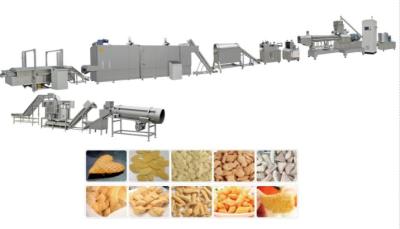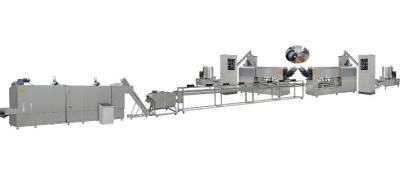Sustainable Practices in Pet Food Machine Manufacturing
What is sustainability in pet food?
In the context of pet food production, sustainability refers to the implementation of practices that strive to meet the nutritional needs of pets while minimizing the environmental
impact and considering ethical considerations. It involves finding a delicate balance between providing high-quality nutrition for our pets and ensuring that the methods used to
produce and source those products are environmentally responsible and socially conscious.
When it comes to sustainability in pet food, it is crucial to consider the ingredients used in the production process. This includes sourcing ingredients that are responsibly grown,
harvested, and raised. For example, choosing suppliers that prioritize organic farming methods, sustainable fishing practices, and ethical treatment of animals.
Furthermore, sustainability in pet food also takes into account the balance between nutrition and environmental impact. It involves optimizing the nutritional content of pet food
to provide high-quality ingredients while minimizing waste and resource consumption. By carefully formulating pet food recipes, manufacturers can reduce the environmental footprint
associated with the production, processing, and transportation of these products.
Ethical considerations are also integral to sustainability in pet food. This involves ensuring the well-being of animals throughout the supply chain - from the sourcing of ingredients to the
manufacturing process and even the packaging used. Ethical considerations may include supporting fair trade practices, humane treatment of animals, and avoiding any ingredients sourced
from endangered or overexploited species.
By considering the interplay of nutrition, environmental impact, and ethical considerations, sustainability in pet food aims to provide pet owners with products that not only meet the nutritional
needs of their furry companions but also align with their values and contribute to a more sustainable future.
How can we make pet food more sustainable?
There are several approaches to making pet food more sustainable, focusing on sustainable ingredients, waste reduction, and eco-friendly packaging. By adopting these practices,
we can minimize the environmental impact of the pet food industry and create a more sustainable future for our pets.
a. Sustainable ingredients:
Emphasize the use of responsibly sourced, organic, and locally sourced ingredients.
Prioritize suppliers that follow sustainable farming practices such as regenerative agriculture, which promotes soil health and biodiversity.
Consider plant-based protein sources as alternatives to meat-based ingredients, reducing the ecological footprint of pet food production.
b. Waste reduction:
Improve production efficiency to minimize waste during manufacturing processes.
Implement portion control measures to reduce food waste, such as portion packaging or guidelines for pet owners.
Develop strategies for repurposing by-products or excess ingredients, promoting the concept of a circular economy within the industry.
c. Eco-friendly packaging:
Opt for packaging materials that are biodegradable, recyclable, or made from renewable resources.
Explore innovative packaging solutions, such as compostable or plant-based packaging materials, to reduce the environmental impact of packaging waste.
Encourage pet owners to choose products with minimal packaging or bulk options to decrease overall waste.
By incorporating sustainable ingredients, reducing waste, and choosing eco-friendly packaging, we can significantly enhance the sustainability of pet food production.
These practices not only reduce the ecological footprint but also create opportunities for conscious consumer choices, allowing pet owners to feel confident that they are
making environmentally responsible decisions when choosing pet food options.
Sustainable practices in pet food production:
When it comes to pet food production, adopting sustainable practices is essential to ensure the well-being of pets and the environment. Here are two key sustainable practices in
pet food production:
a. Sustainable farming methods:
Organic agriculture: This farming method involves the use of organic fertilizers, natural pest control, and the avoidance of synthetic chemicals, pesticides, and genetically modified
organisms (GMOs). Choosing organic ingredients for pet food ensures that harmful chemicals are not present.
Regenerative agriculture: Regenerative agriculture focuses on restoring and improving the health of the soil, enhancing biodiversity, and reducing erosion. By implementing regenerative
agriculture practices, pet food manufacturers can contribute to carbon sequestration and land restoration. This approach emphasizes sustainable land use and promotes soil health, water
conservation, and wildlife habitat preservation.
b. Responsible ingredient sourcing:
Local sourcing: Opting for locally sourced ingredients helps reduce the carbon footprint associated with transportation and supports local farmers or suppliers. It promotes regional
food systems and fosters community development.
Ethical suppliers: Selecting suppliers who prioritize ethical sourcing and farming practices is crucial. This includes considering factors such as fair trade, humane treatment of animals,
and avoiding ingredients sourced from endangered or overexploited species. It ensures that pet food manufacturers are committed to socially responsible practices throughout the supply chain.
By adopting sustainable farming methods and partnering with responsible and ethical ingredient suppliers, pet food manufacturers can make significant strides towards reducing the environmental impact
of their products. These practices contribute to the preservation of natural resources, support local communities, and provide healthier and more environmentally friendly options for pets.
Examples of sustainable food practices:
In the pet food industry, there are various sustainable practices that can be implemented to promote a more environmentally conscious and responsible approach.
Here are some examples:
a. Reducing food waste:
Implementing efficient inventory management systems to minimize food waste during manufacturing and distribution processes.
Educating pet owners about proper portion sizes and storage techniques to prevent overfeeding and food spoilage at home.
Utilizing by-products or nutrient-rich ingredients that might otherwise go to waste, reduces overall food waste.
b. Promoting plant-based diets:
Offering plant-based or vegetarian options for pets helps reduce the environmental impact associated with meat production.
Using alternative protein sources derived from plants, such as legumes, lentils, or pea protein, to provide balanced nourishment.




